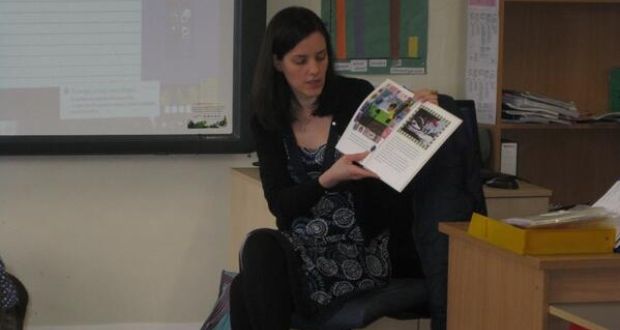
How to Use Satire in Writing
thelondoneconomic.com – Wednesday May 17, 2017

Satirical writing probably seems like a very challenging thing to attempt, especially if you are an inexperienced writer. But, you can use satire in writing once you learn how. Of course, understanding that satire is comedic criticism will more than likely help you in the process?
You will see satirical writing aimed at current news and other broad topics that most people are well-aware of them. It means that before you can start writing whole satire pieces, you will have to ensure that you are up to date on the headlines. Imagine that you will be attempting to write for Saturday Night Live (SNL) as they regularly poke fun at the day’s top stories.

Giles Foden on the art of writing
irishtimes.com – Thursday April 27, 2017

The foreword to The Ogham Stone, UL’s journal of creative writing, explores what language can do and the craft of its featured writers.

Writer seeks Kindled spirit: Six novelists reveal how to self-publish successfully
dailymail.co.uk – Sunday April 16, 2017

The dawn of the digital era means that authors can self-publish their books – and make a fortune. Laura Silverman asks six independent novelists to reveal the secrets of clicking with your readership.

Kameron Hurley: How to Write a Book in a Month
locusmag.com – Monday April 10, 2017

We all want to learn how to write books faster. The pace of the news cycle today has heated up to such an extent that for those of us who aren’t in the 1% of writers, if we don’t come out with a book a year, it feels like the world has forgotten us amid the buzz of ever more intensifying world horror. I’m not immune to this pressure. Juggling a day job, a book a year (writing), a book a year (promoting), and completing various freelance articles like this one takes its toll. Stuff goes out late. It’s pushed out. It squeezes in just under the wire (like this column). At some point when you’re on the writing treadmill, it feels like you’ve gotten so behind that you’ll never catch up again.
Is Book Publishing Too Liberal?
publishersweekly.com – Saturday April 8, 2017
When Simon & Schuster announced in late February that it is canceling Milo Yiannopoulos’s book, Dangerous, many in the publishing industry reacted with a sigh of relief. The six-figure book deal that the right-wing provocateur landed at Threshold Editions, S&S’s conservative imprint, late last year caused a wave of criticism—from various factions of the media, the public, and the house’s own authors. And, though it’s still unclear what ultimately motivated the publisher to yank the book, the fervor that the alt-right bad boy’s deal caused put some on alert. Could other publishers be pressured into canceling books by controversial conservatives? Does the industry have a double standard for authors on the right? Does it matter?

‘Just five more minutes …’: the joy of writing for children
irishtimes.com – Thursday April 6, 2017

There’s something magical about writing for 9-12-year-olds. I have loved books all my life, but it was at this age that I remember most clearly the overwhelming compulsion to keep reading, to find out what happens next, just one more chapter, just five more minutes. It’s the age when you first discover the joys of reading by torchlight under your duvet, the rest of the house quiet, hoping you won’t be caught before your hero escapes from the bad guys.
Writing in the time of great editors
mysanantonio.com – Tuesday April 4, 2017
Editors are the invisible hands that guide publishers and help writers strengthen their craft to achieve greatness. When thinking of greatness, I am reminded of Malvolio’s soliloquy in Shakespeare’s “Twelfth Night” when he says: “Some are born great, some achieve greatness, and some have greatness thrust upon ’em.”
Scrivener & Sons’ editor Maxwell Perkins was one of those born great. He edited Ernest Hemingway’s liberal use of salty language and fear of semicolons, resolved F. Scott Fitzgerald’s hesitation for book titles (Perkins replaced “Trimalchio in West Egg” with “The Great Gatsby”) and hacked off Thomas Wolfe’s purple prose and redundancy.

How to get a job in digital publishing
thebookseller.com – Wednesday March 29, 2017

No doubt you’ve heard many times about how competitive publishing is - and I’m not going to say otherwise. However, as someone ‘on the inside’ who recruits new employees for entry-level roles in the ebooks department at Penguin Random House, it’s part of my job to hold open the door for newcomers. Who might just be you.

‘Writing is not about youth but about spark’
irishtimes.com – Monday March 27, 2017

I’ve noticed recently that letters to young writers are becoming fashionable, for example, Colum McCann’s forthcoming book. But, in my case, I didn’t get my first story published till I was 30 and my first collection launched till I was 37. I wasn’t so much a late starter as a late knuckle-downer. So, this piece is for the not-so-young writers who should still go for it and make an impact on the world. Here are my pearls of wisdom (hopefully not paste):

Eight reasons that even a good book is rejected by publishers
scroll.in – Sunday March 26, 2017

Several years ago, as an aspiring novelist with stardust in my eyes, I used to spend most of my waking hours in Yahoo’s Books and Literature chatroom in the company of fellow aspiring writers. I clearly remember how one of the main topics of conversations used to be the number of rejection slips one had received on that particular day (or the previous week), agents/publishers who had requested a synopsis or proposal, and those who had just not bothered to respond. All of us were united by the looming sense of uncertainty, suspense, and the palpable realisation that the odds were firmly stacked against us.
Today, having spent more than seven years on the other side, first as a consultant and then an agent, I think many writers have wrong notions about rejections. While most books are rejected because of poor quality and incompetence (as they should be), there are several other factors that play a role in publishing decisions. And these affect “good” books too.
Get the free newsletter | Submit a news item or article | Get Writers' News for your website





